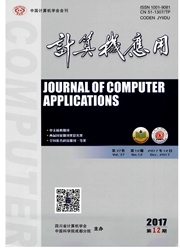

 中文摘要:
中文摘要:
在高维多目标优化问题中,Pareto支配关系存在非支配解随优化目标数增加呈指数级增长和种群选择压力下降等问题。针对这些问题,基于线性权重聚合函数和支配关系两种比较多目标解方法的思想,提出一种线性权重最优支配关系(LWM.dominance),并理论证明了LWM非支配解集是Pareto非支配解集的子集,同时保留了种群中重要的角解。进一步地,基于LWM支配关系,实现了一个高维多目标进化优化算法,基于该算法的实验验证了LWM支配关系的性质。在随机解空间中的实验结果表明LWM支配关系适用于5~15个目标的高维多目标优化问题,通过DTLZ1~DTLZ7高维多目标优化问题进化过程中LWM非支配解集与Pareto非支配解集规模的对比实验,结果表明优化目标数为10和15时非支配解的比例平均下降了约17%。
 英文摘要:
英文摘要:
In Many-objective Optimization Problems (MaOP), the Pareto dominance has exponential increase of non- dominated solutions and the decrease of selection pressure with increasing optimization objectives. To solve these issues, a new type of dominance, namely Linear Weighted MinimaL/Maximal dominance (LWM-dominance) was proposed based on the ideas of comparing multi-objective solutions by using linear weighted aggregation and Pareto dominance. It is theoretically proved that LWM non-dominated solution set is a subset of Pareto non-dominated solution set, meanwhile the important comer solutions are reserved. Furthermore, an MaOP algorithm based on LWM dominance was presented. The empirical studies proved the corollaries of the proposed LWM dominance. In detail, the experimental results in random objective space show that the LWM dominance is suitable for the MaOPs with 5 - 15 objectives; the experiment on comparing the number of LWM non- dominated solutions and Pareto non-dominated solutions with subjects of DTLZ1 - DTLZ7 shows that the proportion of non- dominated solutions decreases by about 17% on average when the number of optimization objectives is 10 and 15.
 同期刊论文项目
同期刊论文项目
 同项目期刊论文
同项目期刊论文
 期刊信息
期刊信息
